Upcoming CCTS Events
 Forte Research Systems selected the CCTS Partner Network Hub as the Spring 2018 Top Performer for OnCore Organizations. Rutgers Cancer Institute of New Jersey won Most Improved. Forte announced the recipients at its Onsemble Conference in late March 2018.
Forte Research Systems selected the CCTS Partner Network Hub as the Spring 2018 Top Performer for OnCore Organizations. Rutgers Cancer Institute of New Jersey won Most Improved. Forte announced the recipients at its Onsemble Conference in late March 2018.
The Site Benchmark awards are presented twice a year to sites that achieve the highest overall score when compared to an anonymized aggregate of peer organizations in Forte’s Site Benchmarks collaborative community. The overall score is determined by combining metrics across all categories and comparing an organization’s percentile rankings to similar organizations. Metric categories include several key steps in study start up, such as cycle times for IRB approval and open to accrual of first patient, percent target enrollment met, and SAE reporting timelines.
Our congratulations to the UAB OnCore implementation team for their masterful launch and superb collaboration, which set the stage for this award.
 Forte executives Shree Kalluri (CEO) (3rd from l) and Laura Hilty (VP-Product Strategy) (far right) join representatives from the Hub’s OnCore team: (l to r) Victor Stark, Lisa Williams, Mark Marchant (holding award), Steve Loyd, and Naseem Anjum.
Forte executives Shree Kalluri (CEO) (3rd from l) and Laura Hilty (VP-Product Strategy) (far right) join representatives from the Hub’s OnCore team: (l to r) Victor Stark, Lisa Williams, Mark Marchant (holding award), Steve Loyd, and Naseem Anjum.
With attendees from seven of our 11 Partners, CCTS was well-represented at TS18, which took place in Washington, DC, April 19-21. Faculty, trainees, and staff presented and connected, visiting Congressional offices, discussing best practices with colleagues, and exploring innovations across the translational research spectrum. The meeting drew more than 1100 attendees, including ~600 newbies and a record number of abstracts.
In case you missed it, below we share a few of the highlights.
TS18 Highlights
Presentations
 CCTS Director Dr. Robert Kimberly, who started the meeting as the Association for Clinical and Translational Science (ACTS) President-Elect and ended it as President for the coming year, moderated sessions on artificial intelligence and machine learning in clinical research and precision medicine and helped emcee the closing plenary session on science communication, which featured The Los Angeles Times Science and Medicine Editor Karen Kaplan and American Association for the Advancement of Science (AAAS) CEO Emeritus Alan Leshner, PhD.
CCTS Director Dr. Robert Kimberly, who started the meeting as the Association for Clinical and Translational Science (ACTS) President-Elect and ended it as President for the coming year, moderated sessions on artificial intelligence and machine learning in clinical research and precision medicine and helped emcee the closing plenary session on science communication, which featured The Los Angeles Times Science and Medicine Editor Karen Kaplan and American Association for the Advancement of Science (AAAS) CEO Emeritus Alan Leshner, PhD.
Dr. Matt Might, Director, UAB Precision Medicine Institute, discussed precision medicine’s challenges and opportunities to advance personalized medicine with a standing-room-only audience.
Dr. Molly Wasko, CCTS Executive Council member and Professor and Associate Dean for Research, Innovation, and Faculty Success, UAB Collat School of Business, led a session on “Enabling Entrepreneurship.”
 Dr. Mercedes Morales-Aleman, CCTS Scholar and Assistant Professor at UA Dept. of Community and Rural Medicine, described how she developed “A Conceptual Model of Healthcare Access for Adolescent Latinas in the US South.”
Dr. Mercedes Morales-Aleman, CCTS Scholar and Assistant Professor at UA Dept. of Community and Rural Medicine, described how she developed “A Conceptual Model of Healthcare Access for Adolescent Latinas in the US South.”
Dr. Jeffrey Engler, National Research Mentoring Network, discussed “Novel Approaches to Successful Grant Writing.”
Dr. Carolyn Jones presented “Development of New Tools for Evaluation of Training.”
Awards
Naveed Farrukh, Pre-Doc Trainee at UAB, received the TL1 Blue Ribbon Awards for Chronic pain in older survivors of hematopoietic cell transplantation (hct) – a report from BMTSS-2.
Huixan Hong, MD, MS, received the American Federation for Medical Research’s Henry Christian Award for her research on IL-23 Regulates Recruitment of CD40L into the B:T Immunological Synapse in Autoimmune BXD2 Mice.
Jamye Locke, MD, Surgical Director of the Incompatible Kidney Transplant Program at UAB Hospital, received one of five Translational Science 2018 Awards for “Translation from Clinical Use into Public Benefit and Policy.”
Ramya Singireddy, Pre-Doc Trainee at UAB, received the TL1 Gold Ribbon Award for "Exploring Müller cell-cone interactions in human fovea using 3-dimensional volume electron microscopy (EM).
 Collaboration
Collaboration
As per tradition, CCTS Partners UAB and Tulane once again hosted a CCTS Scholars’ Dinner at Lebanese Taverna to catalyze collaboration among trainees from across the Network and between pre-docs and faculty from other Partner institutions. A special thanks to Tulane Research Navigator Ines Alamo and CCTS Training Academy Program Director Becky Reamy for organizing.
Posters
Carla Ammons
UAB, Pre-Doc Trainee
Neural correlates of face processing in autism spectrum disorder: a quantitative meta-analysis of current literature & future directions
Mai Do, MD, MPH, DrPH and Jennifer McCleary, MSW, PhD
Tulane
Social, cultural, and cognitive factors that facilitate or impede and individual's use of behavioral healthcare
Amanda Dumas
Louisiana State University Health Sciences Center
Mind the gaps: the contraceptive experiences of parenting adolescents
Naveed Farrukh
UAB, Pre-Doc Trainee
Chronic pain in older survivors of hematopoietic cell transplantation (hct) – a report from BMTSS-2
Abby Gamble
University of Mississippi Medical Center
Exploring exercise behavior in pregnant and postpartum adolescents in Mississippi
Elena Gibson
UAB, Pre-Doc Trainee
Perceived susceptibility to cervical cancer among African American women in the Mississippi delta: does adherence to screening matter?
Anne Gilmore
Pennington Biomedical Research Center- LA CaTS
Attitudes toward physical activity and nutrition intervention during cancer treatment
Juan Gao
LSUHSC School of Medicine- LA CaTS
Radiofrequency renal denervation attenuates kidney fibrosis in spontaneously hypertensive rats
William “Tom” Harris
UAB
miRNA manipulation to improve CFTR correction in pediatric cystic fibrosis
Muhan Hu
UAB, Pre-Doc Trainee
Novel PGF2a synthesis pathway in epithelial ovarian cancer
Aditi Jani
UAB, Pre-Doc Trainee
The role of interleukin-23 in human melanoma
Renata Jaskula-Sztul
UAB
Synaptic vesicle 2 receptors as a novel targets for neuroendocrine cancer therapy
Tiffany Kaul
Tulane - LA CaTS, Pre-Doc Trainee
L1 expression analysis in adipocyte derived stem cells
Jenna Lebersfeld
UAB, Pre-Doc Trainee
The SAM robot: a social skills intervention for children with autism spectrum disorder
Margarite Matossian
Tulane - LA CaTS, Pre-Doc Trainee
Patient-derived xenografts as translational models for targeted therapeutic research in triple negative breast cancer
Christina Muzny
UAB
Genital microbiomes of women with recurrent bv and their regular male sexual partner
Candice Myers
Pennington Biomedical Research Center- LA CaTS, Faculty/Scientist
Psychological mechanisms linking food insecurity and obesity
Matthew Neu
UAB, Pre-Doc Trainee
Attitudes and preferences for return of results from next-generation sequencing
Milza Opper
UAB, Pre-Doc Trainee
Identification of herpes simplex virus (hsv) shedding in the female genital tract of pregnant women by the xpert hsv 1/2 assay and routine pcr
Ibolya Rutkai
Tulane - LA CaTS
The role of mitochondria in the cerebral circulation
Rachel Sabol
Tulane - LA CaTS, Pre-Doc Trainee
High-intensity focused ultrasound (hifu) can be used synergistically with tamoxifen to overcome resistance in preclinical and patient derived xenograft models
Ramya Singireddy
UAB, Pre-Doc Trainee
Exploring Müller cell-cone interactions in human fovea using 3-dimensional volume electron microscopy (EM)
Kathrin Zimmerman
UAB, Pre-Doc Trainee
Post-traumatic stress symptoms and caregivers of pediatric hydrocephalus population
Karam Zakharia
Tulane, Pre-Doc Trainee
Chop-r is an efficient treatment for primary dural diffuse large b-cell lymphoma (pd-dlbcl): a systematic review of 45 cases
TS19

The TS annual meeting, cohosted by ACTS, AAAS, the Association of American Medical Colleges (AAMC), the American Federation for Medical Research (AFMR), and the Clinical Research Forum (CR Forum), is the preeminent scientific meeting for translational researchers. Mark your calendar for TS19, which will take place in Washington, DC, March 6-9.
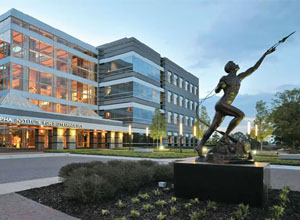
Researchers from two CCTS Partner Network institutions—HudsonAlpha Institute of Biotechnology (HA) and UAB—recently announced they have developed a test that can identify people with colon polyps. The blood serum test, which detects changes in RNA molecules associated with colorectal adenomas, could replace the discomfort of routine colonoscopies (most especially their prep) and increase the number of adults 50 or older who get screened as recommended by the American Cancer Society.
The study, which was published in Clinical Cancer Research, applied high-depth small RNA sequencing to plasma from a large (n=189) cohort of patients, balanced for age, sex, and ancestry. The team, which included CCTS HA Site Lead Dr. Richard Myers and CCTS Director Dr. Robert Kimberly, replicated sequencing results on plasma samples from an independent cohort (n=140). The test accurately detected adenomas in patients under 50 and worked well regardless of sex or ancestry.
Although more work is needed before patients might expect to request the blood test over a routine colonoscopy, the HA-UAB research team is optimistic that blood-based screening will become a reality for detecting colon polyps and, eventually, for detecting colon cancer as well.
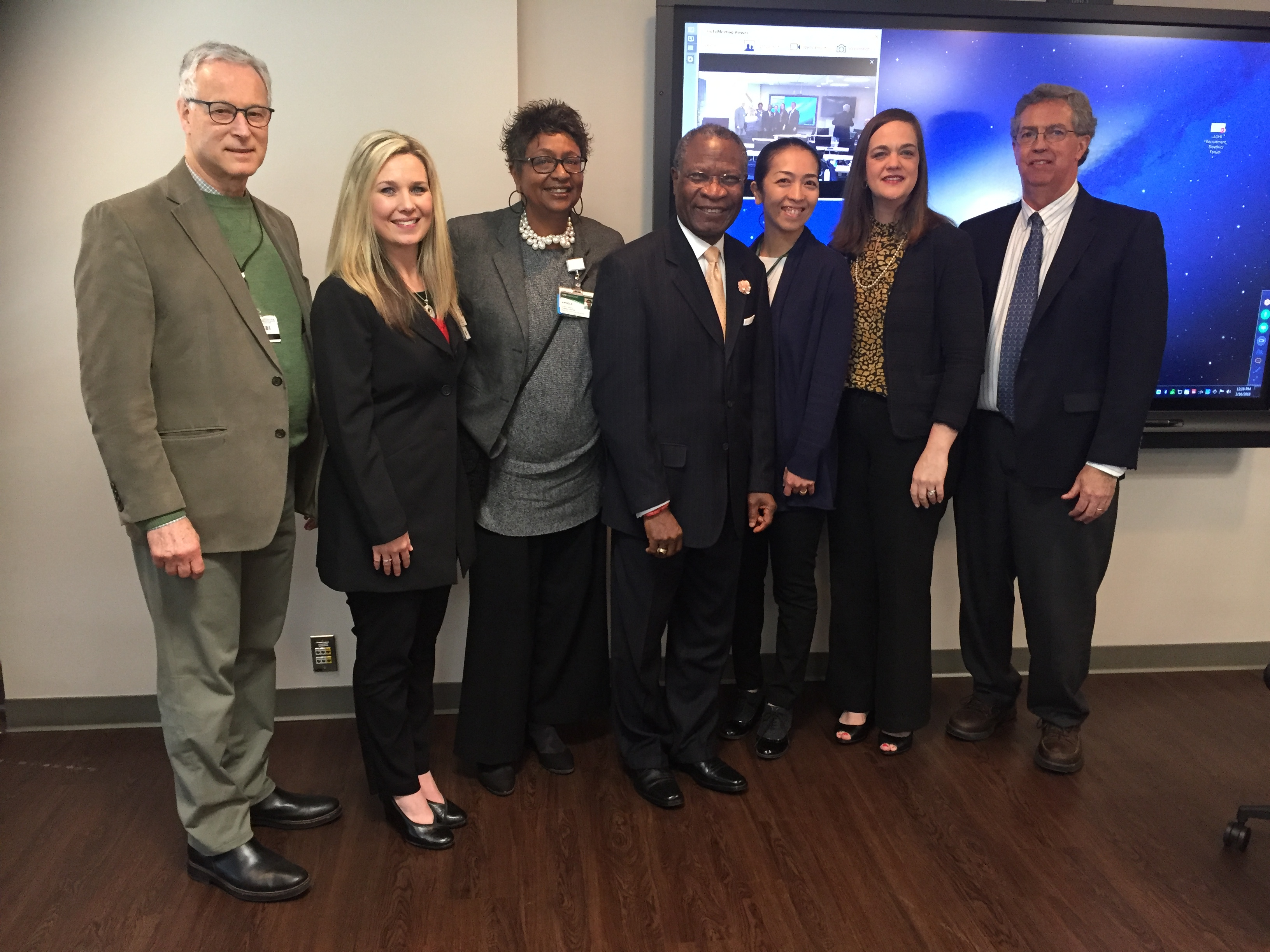 The 3rd Annual CCTS Bioethics Forum speakers: (l to r) AGHI PI and CCTS Director of Genomic Medicine Dr. Bruce Korf, AGHI Recruitment Manager Julie Schach, AGHI Study Navigator Angela Williams, CCTS Bioethics Expert Dr. Stephen Sodeke, Bioethics Professor Dr. Mariko Nakano, AGHI Program Director Renie Moss, and CCTS Training Academy Co-Director Dr. David Chaplin.
The 3rd Annual CCTS Bioethics Forum speakers: (l to r) AGHI PI and CCTS Director of Genomic Medicine Dr. Bruce Korf, AGHI Recruitment Manager Julie Schach, AGHI Study Navigator Angela Williams, CCTS Bioethics Expert Dr. Stephen Sodeke, Bioethics Professor Dr. Mariko Nakano, AGHI Program Director Renie Moss, and CCTS Training Academy Co-Director Dr. David Chaplin.
What is trust? What helps build or derail it? Why does it matter to research participants, to investigators? How can a research institution demonstrate trustworthiness to potential participants? What does equitable, ethical participation in research by underrepresented populations look like? And what methods can be used to measure the effectiveness of efforts to develop trust and trustworthiness in research?
These thought-provoking questions formed the basis of the 3rd Annual CCTS Bioethics Forum, which took place on Friday, March 16, 2018. The speakers, including CCTS Bioethics Expert and Tuskegee Bioethicist and Professor of Allied Health Dr. Stephen Olufemi Sodeke, UAB Assistant Professor of Bioethics Dr. Mariko Nakano, and Co-Manager of Recruitment and Retention Shared Facility Julie Schach, set an ambitious agenda: to explore the role of trust and trustworthiness in eradicating barriers to participation in genetic and genomic research.
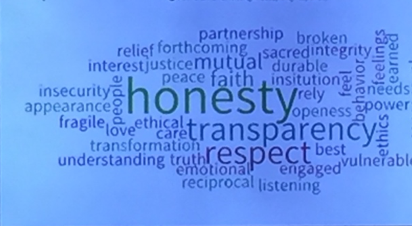 A word cloud created in real time via text answers to “what words come to mind when you think of trust and trustworthiness?” Honesty, transparency, and respect topped the list.
A word cloud created in real time via text answers to “what words come to mind when you think of trust and trustworthiness?” Honesty, transparency, and respect topped the list.
A History of Betrayal
Using an array of interactive exercises, videos, and other dialog prompts, the speakers guided attendees through two key historically relevant research projects that betrayed the trust of their participants: the Tuskegee Syphilis Study (TSS) and the Diabetes Project with the Havasupai Tribe. Both resulted in major changes in how research is currently conducted using established Institutional Review Boards (IRB) and informed consent procedures. A migration study based on unauthorized use of the Havasupai blood samples also raised the issue of the need for protection of genetic information for groups as well as individuals.
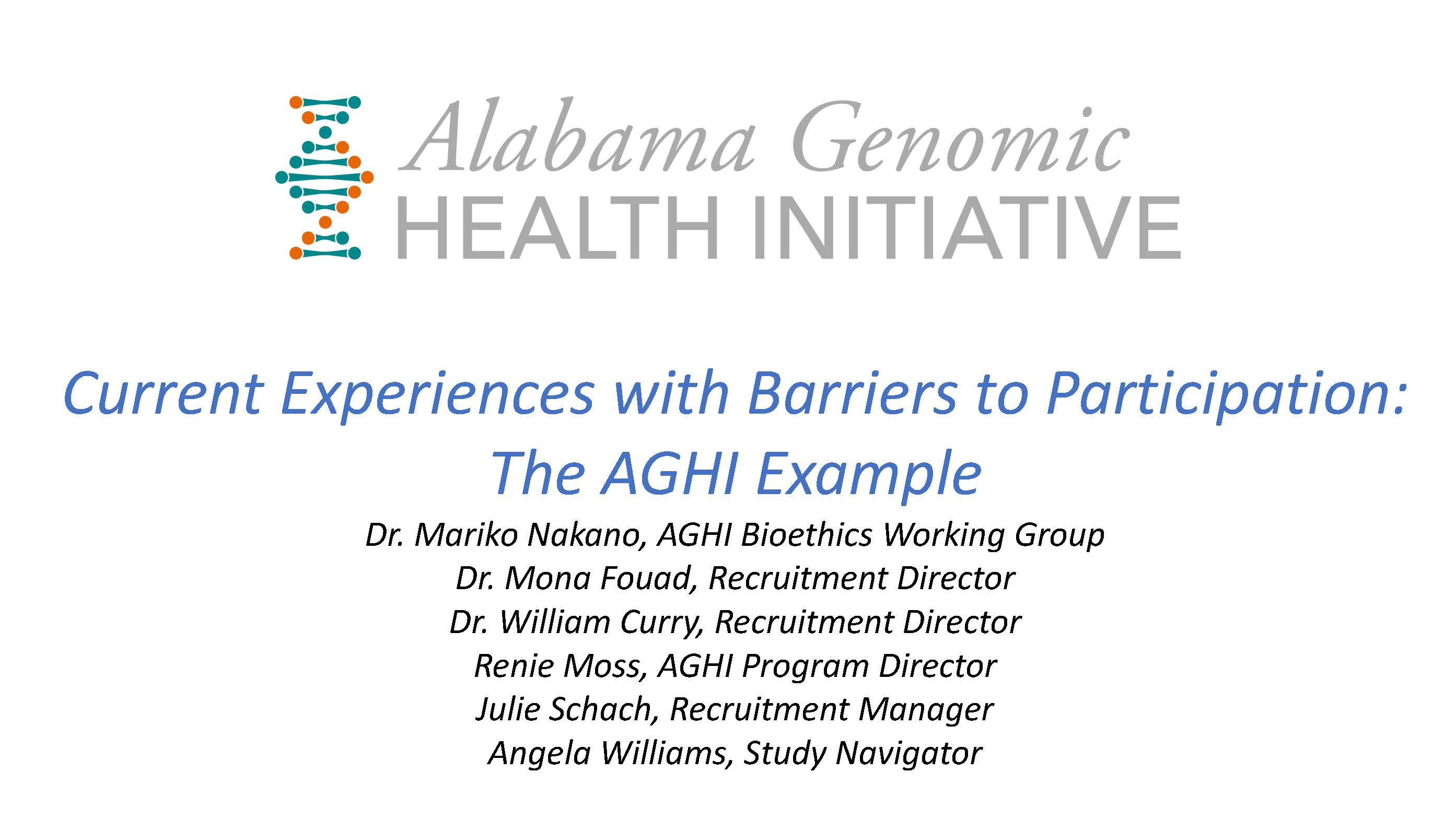 The AGHI presentation underscored the value of incorporating bioethics in the earliest planning stages of a genomics study.
The AGHI presentation underscored the value of incorporating bioethics in the earliest planning stages of a genomics study.
Sodeke shared an excerpt from a speech by Mr. Herman Shaw, spokesperson for TSS survivors, given at the Apology Ceremony held by the Clinton Administration in 1997. Shaw stated that the damage inflicted by the unethical treatment of the African American airmen and their families was far deeper than any physical wounds suffered, indicating that the legacy of distrust in medical research was still vivid decades later. “Investigators must realize they are starting from a ‘Give me a compelling reason why I should trust you?’ basis,” Sodeke said.
Despite the historical distance, both cases underscore the moral tension that exists between researchers and participants. Even if research is conducted ethically by today’s IRB standards, Sodeke noted, trust can be difficult to establish and is easily lost, to the detriment of improved health outcomes for all concerned. “We need a glimpse of imagination to go beyond regulation, beyond merely doing what the IRB tells us we must do. Regulations are the floor, not the ceiling.”
A Bioethics Paradigm Shift: The Alabama Genomic Health Initiative (AGHI)
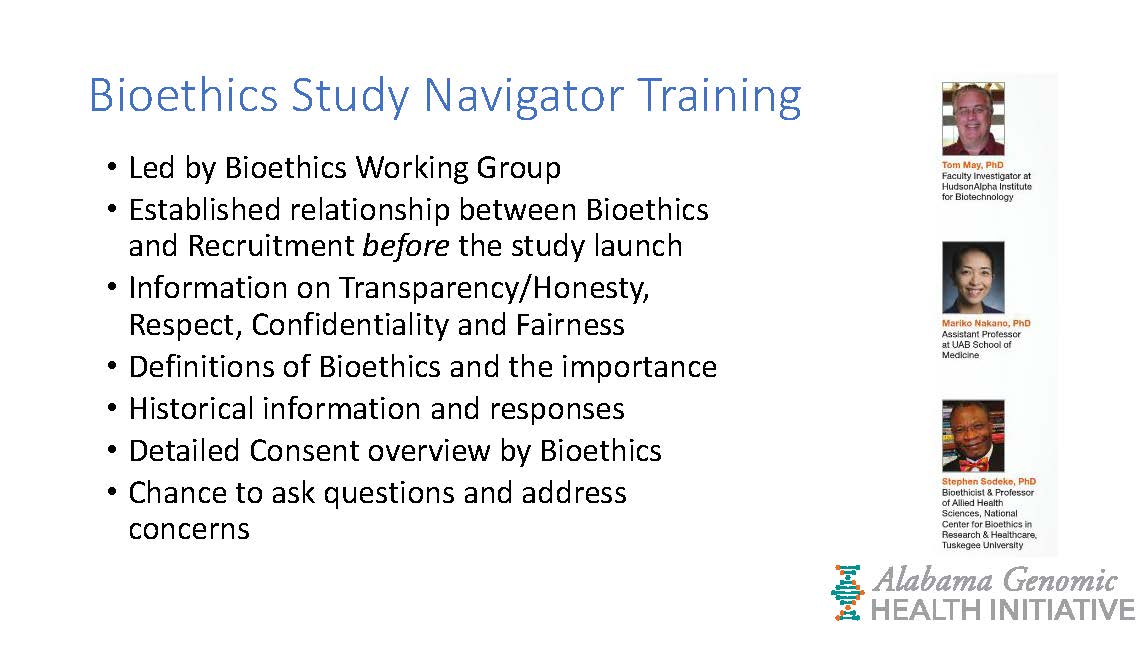 A list of the many ways bioethics experts contributed to training patient navigators and ensuring the AGHI recruitment process was transparent, ethical, and trustworthy.
A list of the many ways bioethics experts contributed to training patient navigators and ensuring the AGHI recruitment process was transparent, ethical, and trustworthy.
The AGHI, led by CCTS Director of Genomic Medicine and UAB Chief Genomic Officer Dr. Bruce Korf, was explored next as an example of a study that is going the extra mile to build and maintain trust. The project, which involves CCTS Partners UA, USA, HudsonAlpha and the Hub in collaboration with UAB branch programs in Montgomery, Selma, Huntsville, and Cooper Green, aims to test the blood samples of 10,000 Alabamians for 59 genes associated with treatable medical conditions. To ensure the state's diverse population is accurately represented, regaining trust was the foremost concern, according to ethicist and UAB School of Medicine Assistant Professor Dr. Mariko Nakano.
AGHI Recruitment Manager Julie Schach described the many steps taken to inspire and maintain trust, including involving bioethics experts in the protocol and recruitment design process; ensuring the informed consent process was “plain language” and clear to all participants regardless of education level; and including the use of community health advocates as study navigators to ensure participants understand the purpose of the study and the choices they have concerning results and how their data will be used in the future. Angela Williams, one of AGHI’s study navigators, further discussed the process for guiding potential participants through the 13-page informed consent document.
 Participants in AGHI have the power of choice over their data, including who sees their results and if they may be used in a future study.
Participants in AGHI have the power of choice over their data, including who sees their results and if they may be used in a future study.
Next Steps: A Dialogue
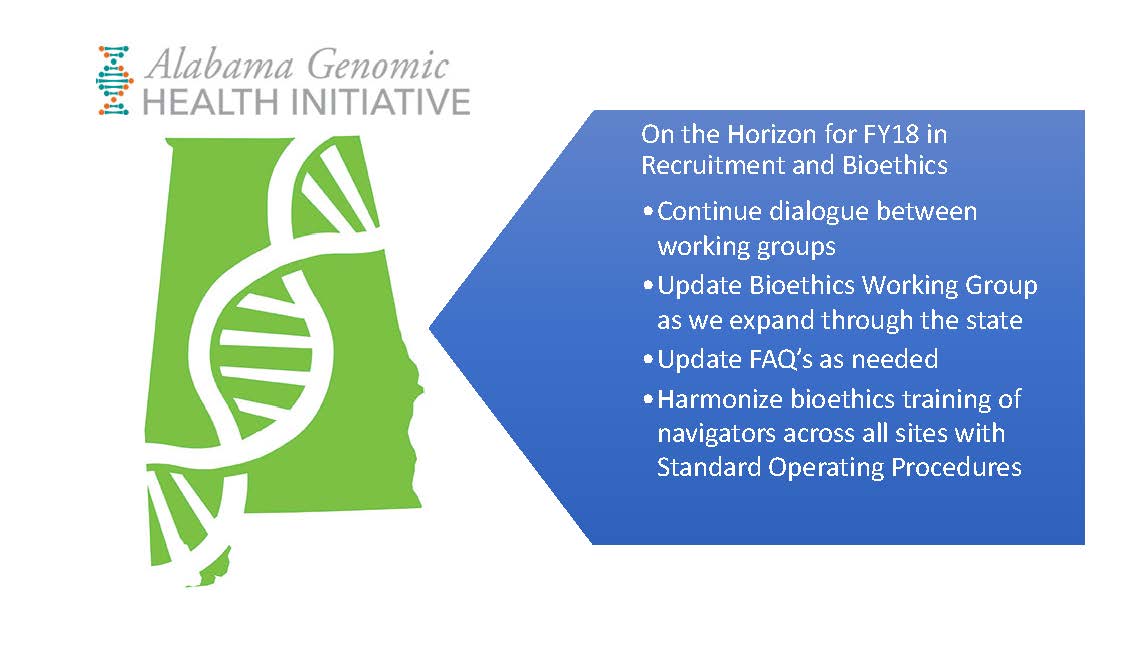 The Bioethics Working Group continues to work with the AGHI principal investigators to ensure the same ethical standards apply to recruitment in all Alabama sites.
The Bioethics Working Group continues to work with the AGHI principal investigators to ensure the same ethical standards apply to recruitment in all Alabama sites.
Although AGHI’s approach represents a far more rigorous level of ethics in population-based genomics research, the audience raised many questions that highlighted remaining trust challenges: Who selected the 59 actionable diseases targeted by AGHI and by what criteria? Why use a broad consent for future use of data instead of contacting subjects each time their data will be reused? Is a 7th grade language level for the informed consent process sufficient to ensure low literacy participants truly understand their risks and rights?
Korf fielded these and other questions, briefly describing the logistical, budgetary, and regulatory realities involved in running a state-wide research project. He emphasized four principles guide all AGHI decisions: transparency, respect, confidentiality, and fairness.
Sodeke reminded the group that “even when warranted, trust is risky and dangerous.” CCTS Training Academy Co-Director Dr. David Chaplin, who facilitated the workshop, agreed challenges remain, noting current events reflect a general sense of distrust in institutions. A participant agreed, suggesting “perhaps we should focus on how to make research institutions more trustworthy instead of expecting potential subjects to trust individual researchers.”
“We must be co-creators of where we go from here,” Sodeke concluded, promising “this dialogue will continue.”
In case you missed it: a video of our 3rd Annual Bioethics Forum will soon be available on the CCTS YouTube channel. The speakers’ slide decks are available below. Subscribe to CCTS Digest to find out about our upcoming events and learning opportunities.
For a deeper look at AGHI’s approach to bioethical issues and why it matters, see UAB Magazine’s “The Ethics of Genetics,” by Matt Windsor.
3rd Annual CCTS Bioethics Forum Slide Decks:
3rd Annual CCTS Partnership Bioethics Forum: Trust and Trustworthiness Series
Alabama Genomic Health Initiative: Current Experiences with Barriers to Participation: The AGHI Example
CCTS commanded attention at the Hub’s latest Core and Shared Resources Day, held at the UAB Hospital West Pavilion Atrium on Wednesday, August 28. CCTS presented 17 posters out of 70 to over 300 visitors showcasing a wide array of our research resources, including specialized expertise and state-of-the-art technology from CCTS Partner Network institutions. Innovative new collaboration and training opportunities, such as i-Panels, U-BRITE, and the Kaizen gamification platform, were featured in addition to our most popular supports such as CCTS Training Academy, clinical research, and regulatory support.
Congratulations to all of our CCTS staff and experts who participated in their outstanding poster presentations! Special shout out to Dr. Anne Russell for managing and organizing CCTS's contribution.























